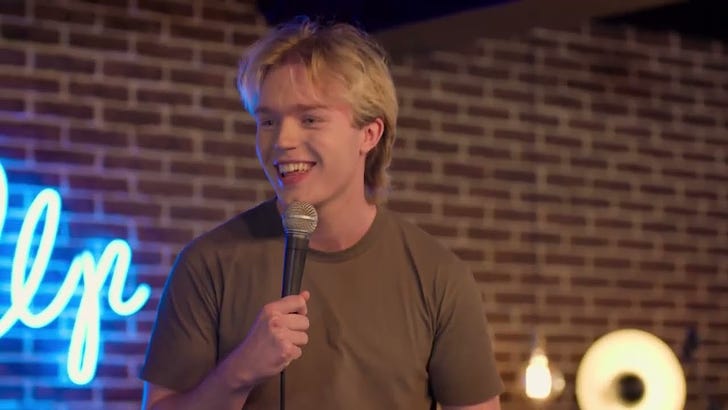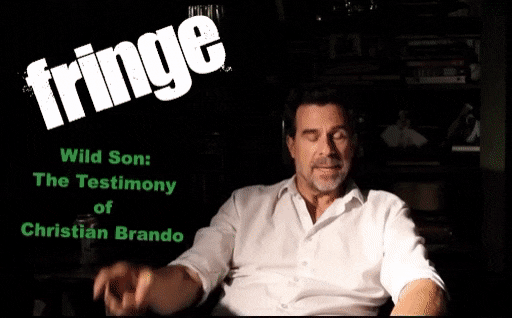The Festival Fringe in Edinburgh marked its 70th year in 2017. They had to cancel events in 2020 due to the COVID-19 pandemic, and 2021’s events were largely scaled down due to the ongoing world health crisis. 2022 has been a glorious comeback for the festival, which traces its long history back to 1947. Originally called the Edinburgh International Festival, it eventually rebranded itself as the “Fringe” in order to incorporate local as well as international talent. As the name suggests, too, the Festival Fringe is about showcasing talent perhaps overlooked or underappreciated in the mainstream media. The cobblestoned Old Town of Edinburgh, built around its magnificent castle, becomes a wellspring of creative expression in endless forms. Take, for example, the case of Finlay Christie. A TikToker and YouTuber, he brought his comedy act, OK Zoomer, to the festival’s Venue 14—the “wee room” at the Gilded Balloon Teviot.

Christie got a 3-star review in The Guardian. He’s 22, but he’s been doing standup since the age of six. According to the review, Christie is both droll and sly in his performance, bouncing “back and forth between optimism and fatalism”1 in his commentary on Gen Z realities, nostalgia, and nuances. Christie makes a “droll distinction between boy and man”2 (hilariously, as in the video above, by the way) and he bemoans having to grow up—yes, even at the age of 22, he has nostalgia for days of innocence. Life is just easier for a boy than a man, he argues. Boys will be boys, ok, but the 2010s, and thus far the 2020s as well, have been a minefield for any boy trying to grow up into a man.
Wild Son: The Testimony of Christian Brando is a one-man show about a man who died just a couple of years prior to this minefield era. If you’ve been following my content long enough, you know that I gave a five-star review to John Mese’s performance of Christian Brando at Bistro Byronz in Baton Rouge.3 That was back in June, on Father’s Day to be precise—ironically, in fact, if you know anything about Christian Brando’s story. For the Festival Fringe this year, Mese performed in Venue 16, Greenside at Riddle’s Court.
The Fringe offered Wild Son its first venue beyond the continental USA. Written by Champ Clark, a journalist who based the play on conversations he had with Brando while drinking Pabst Blue Ribbon, Mese takes the stage as the eponymous character, brought back to life expressly to tell the story as never told before—from Brando’s perspective, from his own mouth even. Notes the actor John Mese, the play’s first line is, “Is it my turn?” Mese proposes that the real star of the play is not him, but the story. It’s Christian’s turn, he says.
“Christian” appears for us in a white shirt and grey slacks, barefoot. The all-black aesthetics (black stage, black chair) compliment and reinforce the stark and raw reality of his story. Thus, Wild Son is about a Boomer male, middle aged,4 whose identity even in death remains overshadowed by father Marlon, one of the “last movie stars.”5 It's a bit different from THE LAST MOVIE STARS, created & directed by Ethan Hawke. That tells one of the 20th century's most epic Hollywood love stories--between Paul Newman & Joanne Woodward. But there wasn't a lot of love circulating in the Brando household. Not that they didn't love each other, the father and the son. Of course they did.... The writer, Champ Clark, who knew Christian Brando personally (and who based the play on interviews between him and Christian over cans of Pabst Blue Ribbon) says, "Christian loved Marlon. He loved him. And Marlon loved Christian, but, man, [fist bump] boom. [Another fist bump] Boom. [Another fist bump.] Like, right from the very beginning. And boom, right to the very end. And they never.... it was never reconciled." Marlon exemplifies a certain idea of toxic masculinity, and his son Christian was a direct victim and extension of that. While Finlay Christie’s act pokes fun at the scary, uncool, reputedly “toxic” Boomer male, I have a sense that there is more in sync than dissonance between the two shows. The Lost Boy is not unique to any generation. It’s just that today the “lost boy” is more or less comparable to what we think of as an incel. In any case, Christie is using comedy to show us the lighter and darker shades of 20-something (male) life today—and it’s undeniable that today’s climate is an especially tricky one for boys to figure out how to be men.6 Wild Son, too, is the story of a kid who got pushed around and abused by his parents, only to grow up and get kicked in the butt by a combination of bad luck and poor judgement.
I'm very privileged and honored to have been able to see the show twice. From showing at several venues up and down and around California, to Louisiana, and now with a Scottish showing under its belt, Wild Son is still a relatively guarded secret of the theatrical industry. The first time I saw it, at Bistro Byronz, I wasn't ready for it. It came to me; it fell into my existence, and I was grateful for that, but the experience of going to it, consciously and knowingly—knowing, that is, what I was in for—opened the door for something completely different.
Christian Brando was convicted of manslaughter in the death of Dag Drollet in 1990. He shot Drollet in a rage after learning that Drollet had been abusing his sister, Cheyenne. That's probably what he is most known and remembered for. That's all I knew about him before I saw the play…well, besides that Marlon Brando was his dad. Christian was a young man in that TV trial. He was the subject of a sensational drama that predated the ultimate courtroom drama of them all—the OJ Simpson trial.
This play by Champ Clark truly captures the story of the broken, the unloved, lost boy. Because even though he lived to (almost) the age of 50, it's doubtful if he ever evolved beyond that broken state. The play addresses the protagonist’s desire to reconcile things with his father. Desire, though, is not the same as fulfillment.
Two things struck me profoundly. The first time, at Bistro Byronz, I was especially moved by the turn of the story after prison: the move to New Hampshire, the training as a welder. The Wild Son reconnected with the beauty of the wilderness. He learned a skill, welding, and it gave him a sense of being able to do something that was useful and productive. He probably never had that before—maybe once before, when he acted in a movie, but his father, metaphorically speaking, took the wind out of that sail.... Welding, though, Christian could do that without his father's ego getting bruised. And he enjoyed being in nature, and I love that he wanted to share that sense of freedom and aliveness with his parents. Mother and father being irreparably damaged themselves, they just thought he was crazy, or on drugs.
Fast forward to the Fringe, and I have now been struck above all by something else:
The Wild Son was exiled to his father's island, Tetiroa, in French Polynesia. He always loved it there (again, he found freedom & peace in the wilderness, this Wild Son) but on this occasion, it was like a prison because of the length of time his father made him stay there. (And this was before the chapter of crime and punishment.) Actor John Mese takes us through the narrative of Christian's escape attempt, how he paddled from island to island in a boat, surrounded by sharks. What a metaphor this is for Christian's life! Paddling in a rough sea full of sharks! Alone, unloved, broken.
A paywall must be crossed to read beyond this point. Please consider supporting my work to gain full access to all articles. I’m writing content all the time, and most of it is free, but some things are especially dear to my heart. This is one of those. I appreciate all subscribers, whether they pay or just read what is freely available.
Keep reading with a 7-day free trial
Subscribe to Heavy Crown Press to keep reading this post and get 7 days of free access to the full post archives.




